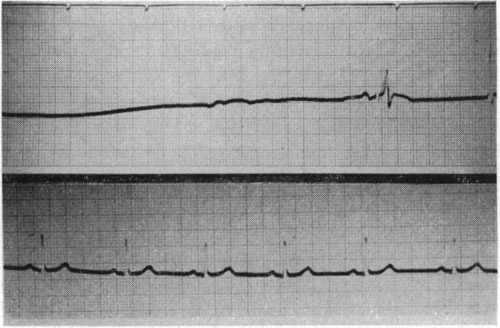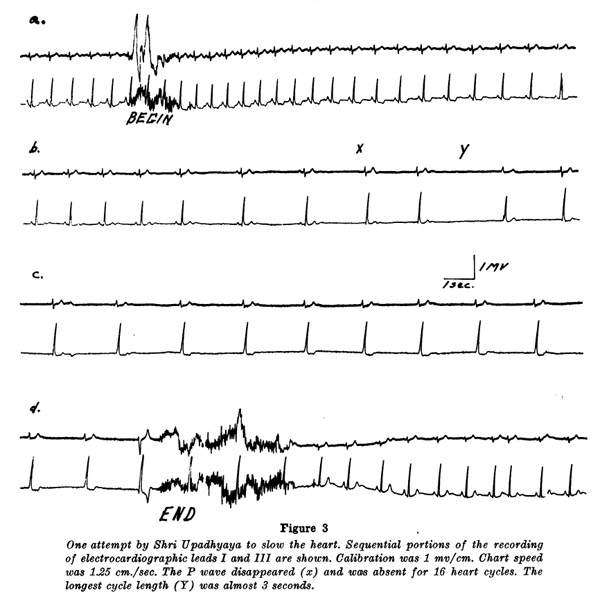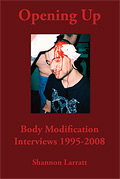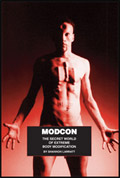I’ve always had an interest in the relationship between the conscious mind and the remainder of the subconsciou mind and body. Nowhere is this more obvious than in the conscious control of autonomic systems, and because of my apnea problems, this has been on my mind a great deal. I have never lost the ability to consciously control my breathing but I do at times lose the ability to control it autonomicly. Anyway, when I was a kid, at about age twelve, I discovered I was able to hold my breath for five minutes or more without any training beyond doing it to pass the time on the long school bus rides that I had as a kid in the country. I don’t feel like it was a particularly unique ability, even though I suspect breath-holds of over five minutes for a modern industrialized child is extremely unusual now that I think about it.
Anyway, about five years ago (you may remember the first time I wrote about it on this blog in 2007), I discovered that I can, at least for short periods of maybe five seconds, completely stop my heartbeat. I do it simply by extreme relaxation and have no training in any related yogic or meditation practices. I don’t have any reason to believe that this is a special ability although I suppose it is possible that it’s related to the genetic damage to my autonomic nervous system. But I don’t think so. After I discovered I was able to do this I started researching it, and I came across a similar individual written up by a Dr. C. M. McClure in the June 1959 California Medicine in an article titled “Cardiac Arrest Through Volition“. Here’s a relevant quote from it, and a picture of the guy’s EKG (the top shows his heart stoppage, the bottom is his normal reading).
A 44-year-old aircraft mechanic of Danish descent was admitted to Lindsay Municipal Hospital, April 24, 1958, because of a cold with cough of two weeks’ duration. He said that in the previous 20 years he had had six episodes of upper respiratory tract infection, and that during these periods he had found that by sitting quietly, relaxing completely and “allowing everything to stop,” he could induce progressive slowing of the pulse until cessation of heart action would occur, then a feeling of impending loss of consciousness. After a few seconds of this sensation, he would take a deep breath and normal heart action would resume. These occurrences resulted in the patient’s developing a fear of sleeping, lest his heart stop and not start again. In 1953 and several times afterward the author verified this story by auscultating the heart and palpating the radial pulse while the patient induced several seconds of cardiac arrest. At these times his color would become the ashen grey of sudden circulatory failure, and partial loss of consciousness would ensue. However, no cardiac irregularities were ever observed during either normal sleep or general anesthesia. Cardiac arrest occurred only when the patient deliberately induced it.

This is my experience exactly. I also spent a while extremely paranoid that I was going to accidentally stop my heart and not have it start again (I think I even hinted at this when I first wrote about it). Reading about this case was very reassuring, both to show me I probably didn’t need to worry, and to give me a little evidence that I hadn’t imagined the whole thing. I suspect there are many people reading this who don’t believe me, and that does bug me a bit more than it probably should. Maybe someone reading this will describe a similar experience and it will turn out that it’s actually not that uncommon.
One of the reasons it’s on my mind is that in two weeks I have an appointment for a detailed and lengthy EEG/EKG related to the possible brain damage occurring due to my genetic abnormality. I’ve been giving serious thought to stopping my heart while I’m being monitored. I figure that means that I’ll have hard proof that no one can deny, and also that since I’ll be in a hospital, if anything goes wrong, it should be possible to revive me. That said, I’m not convinced it’s advisable both because it’s hard to convince myself that it’s fundamentally a good idea to be stopping ones own heart, and because I don’t know how my doctors will respond, even with this blog entry sitting as proof that it’s premeditated and not a “real” cardiac arrest. But yeah, if I do it, I will send them to this blog I suppose.
I have tried to find other research on voluntary control of the heart, and to be honest, I haven’t found as much as I’d like. Of course almost everyone can speed up or slow down their heart just by thinking about it, but stopping — or “pausing” — it is a different matter. And of course I’m not talking about the trick that magicians do where they squeeze the right muscles to control blood flow and make it seem to people that their pulse has stopped where it’s being measured — here’s a YouTube video explaining how to fake stopping your heart but of course that won’t fool an EKG since you’re not actually stopping your heart. I found quite a few articles and studies on Indian Yogis stopping their hearts but the stories are so remarkable — claims of stopping the heart for as long as five days, under “Western scientific observation” — that I have a great deal of trouble believing the majority are anything other than illusion. I paid $11.95 to read a 1973 article in Psychological Bulletin by Edward Blanchard and Larry Young called “Self-control of cardiac functioning” that referred to some hilarious studies in which they trained people to slow down their heart rates slightly (by at most 10%) by giving them electric shocks as punishment for not doing so!!! I’m impressed their heart rates didn’t skyrocket from the stress! But for my specific interest, all this paper did was cite McClure and mention a yogi that was able to drop his heartrate in half using a similar relaxation technique, so it was a wasted purchase overall.
I did find one last thing worth reading, a 1961 article by Wenger, Bagchi, and Anand in Circulation: Journal of the AHA titled “Experiments in India on “Voluntary” Control of the Heart and Pulse” that seemed more legitimate than most of the claims coming out of India at the time, using an 8-channel EKG to investigate yogic claims of the ability to stop the heart. That paper is free to view, and worth a read. I got the impression that most of the yogis were not using a relaxation method (vagal innervation) to “stop” the heart — the studies instead seemed to suggest that they were doing muscle tricks to mask the heart rate, analogous to the YouTube trick linked previously. This is impressive of course, but it’s quite different from what I am interested in. They also discuss a little about the yogi’s restrictions as to what the scientists could measure and what they couldn’t that strongly imply that there’s more illusion than anything medically unusual going on. Generally they could hide the pulse in the wrist, but not in the finger, let alone in the heart itself — big deal — which puts it in the rather obvious “trickery” category. Near the end of the article they discuss a yogi who claimed only to be able to slow his heart, and he’s the only one who I think is using the same method as McClure described, and there is even a 3-second period of disruption:

(I feel like my EKG would look more like the one McClure cites).
Anyway, it’s all quite fascinating to me. There is so little good information on the subject, and an unfortunate amount of deception on the part of yogis. Not that I’m surprised that Eastern mysticism fooled a bunch of Western doctors (it still happens all the time with homeopathy, acupuncture, reiki, and so on), but it’s extremely annoying. Maybe I will add some hard facts to the research when they hook me up to the machines. Or maybe I will chicken out. We shall see!!!



11 Comments
If you have time in your EKG appointment for it, why not mention it to the doctors? Have them do a regular one, and let them know that you’ve had this experience in the past and would like to recreate it on a second EKG. Is that possible?
I knew a guy in high school who could do this. He was a track/cross country runner and very athletic. Until now I’ve never heard of anyone else being able to stop their own heart. He would lay down and slow his breathing; probably a nearly identical process to what you do. I think it would be interesting to hear what the doctors have to say.
Wow. As a point of study to “notice” how heartbeat comes to be/remains/ceases the research would be fully interesting/”worth” playing with this for a minute, with all parties advised (maybe in the last few seconds of testing announce “I’d like to stop my heart now for a second if i could” and just begin. They could say no, or just sit there thinking “yeah right” (likely) and you could stop if asked, without it being insurance fraud or something.
Really though, we’re not watching an evolved control of simply undeveloped abilities in your case.
In most, I bet. We have all relaxed extremely, some of us more than others I have SPILLED more relaxants than most people will ever DO, laughter. No heartbeat stop. It suggests maybe don’t do that for fun…
Too crucial it work on auto, that’s why it does; your condition has exposed the wiring, so to speak, and you’re shorting across connects most likely. It’s playing with a broken leg because it’s not feelable in shock but it sure does move cool. Being as we don’t substantially have a specific hope in mind that’s beneficially achieved in doing this, at least compared to it possibly further engaging a curious defect/symptom and maybe leaving family behind.
No, I don’t think anything will happen either. But I do see your focus on something that isn’t as much as what you’ve already got…
I think about cutting my bad foot off all the time now. I had to stop. Let it go. We believe you, and it is interesting. But NOT as interesting as you, by a long shot. Focus on how to keep it going, not how it stops. Seems there’s a suggestion of what to develop inherent in it maybe, if there’s something to be made of it at all. Play with more relevant ;) with what there is left…
You going to the Chicago convention or anything? We could meet up…hit me back.
You should learn how to play “purple haze” with it and drop that on em at the end (laughter. SOME piece of high art could come out of this…maybe hook you up to an amp and record your reaction to watching our elections or something. Fill a room with funny drunk political friends, stop your heart at all the stupid/lie points Jon Stewart style or something, natural hilarious mockery ensues, make an episode of it.
Dunno, it’s got good political overlap potential somehow as a tactic of exposure/humor. Have fun…
Shannon,
I do remember your earlier blog post (you were lying in the bath, no?). I agree with Elaine: Mention it to the ECG / EKG person, and see if they’re up for it.
Some 10 + years ago, I was heavily into Vipassana meditation and got tot the point where I could induce a complete blackout for a more or lesspre-determined amount of time. I was always curious as to what a
Shannon,
I do remember your earlier blog post (you were lying in the bath, no?). I agree with Elaine: Mention it to the ECG / EKG person, and see if they’re up for it.
Some 10 + years ago, I was heavily into Vipassana meditation and got to the point where I could induce a complete blackout. I was always curious as to what my heart did during that time, as well my level of brain activity.
Wishing you all the very best.
There are times when it’s about walking the talk-talk time.
WHEN YOU’RE WIRED
JUST DO IT
OF COURSE YOU CAN
I’d be afraid if you did it without warning them, that they’d bring out the difibrillator and epinephrine, and that probably wouldn’t be good for you!
I don’t think you are legitimately stopping your heart. Just like you can regulate the involuntary act of breathing, there is some control that can be had over your heart and blood pressure. Rather than legitimately stopping your heart 5 years ago you probably succeeded in lowering your heart rate and more importantly your blood pressure given the experience you described. This lead to a reaction of you faiting, just as you would if you tried to hold your breath for too long. Your body faints as it understands you were doing something foolish so it must remove you from conciousness and allow your involuntary system take over.
I have subscription to PubMed through my schooling (nursing) email me if you find any more articles that you want to read but don’t want to pay for. I can get most health related articles for free and email them to you if you include the title, journal, volume, issue, and year.
All the best,
Robyn
Robyn, confirming my subjective experience and belief as to what happened with objective proof or denial is definitely part of the motivation.
No matter what you do you are going to die.
Post a Comment